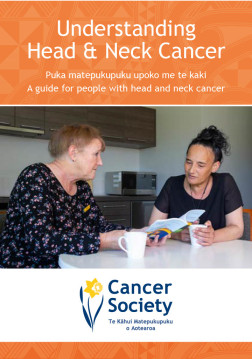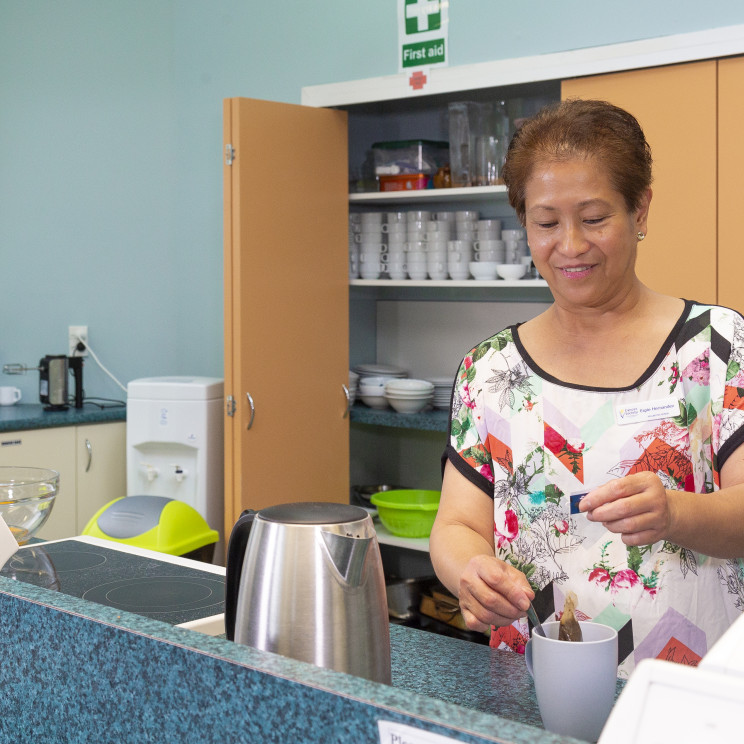Read about living well with head and neck cancer, including finding body positivity, making lifestyle changes and accessing support in your community.
Download the complete head and neck cancer booklet
Our new booklet 'Understanding head and neck cancer' is available now.

Download section six of our head and neck cancer booklet: Living well with head and neck cancer
- A diagnosis of head and neck cancer, and side effects of treatment, can cause changes in your everyday life. These may include changes in body image, energy levels, nutrition, work, your financial situation, and your emotional health.
- Finding ways to focus positively on your body—such as eating well, starting a new exercise programme, and making positive lifestyle changes—can help you live well with head and neck cancer.
- A counsellor can help you to discuss your feelings about the impacts a cancer diagnosis can have.
- Hospitals throughout Aotearoa New Zealand have trained health workers available to support your spiritual, cultural, and advocacy needs.
- Talk to your whānau doctor, or your local Cancer Society, about the support services available for you and your family.
- Ka puta pea he rerekētanga ki ōu mahi ia rā, ia rā, ngā runga i te whakatau o te matepukupuku upoko me te kaki me ngā whai pānga o te maimoatanga. Tērā pea ka puta he rerekētanga ki tō ata tinana, ki ō taumata pūngao, tō kai tōtika, tō mahi, tō tūnga pūtea, me tō hauora hinengaro.
- Mā te rapu huarahi ki te arotau pai ki tō tinana – pērā ki te kai tōtika, te tīmata hōtaka korikori, me te whakamahi whakarerekētanga oranga pai – tērā ka āwhina i a koe noho ora me te matepukupuku upoko me te kaki.
- Ka āhei tētahi kaiwhakarato tohutohu ki te āwhina i a koe ki te kōrero mō ōu kāre-ā-roto e pā ana ki te papānga tērā ka puta nā runga i te whakatau.
- Whai ai ngā hōhipera, huri noa i te motu, i ētahi kaimahi hauora kua whakangungutia, e wātea ana ki te tautoko i ō hiahia ā-wairua, ā-ahurea, ā-whakatūtū hoki.
- Kōrero ki tō tākuta whānau, ki tō Kahui Matepukupuku ā-Rohe rānei, mō ngā ratonga tautoko e wātea ana ki a koe me tō whānau.

Adjusting to changes in body image, keeping active and eating well
Finding ways to focus positively on your body—such as eating well, starting a new exercise programme like yoga, and making positive lifestyle changes—can help you live well with head and neck cancer.
More information on living well with cancer
Keeping active
Keeping active will help you maintain a healthy weight and reduce stress and tiredness. It will also help to keep your bones strong and your heart healthy.
It is important to start any new activity slowly and build up gradually. It can be hard to exercise after treatment for head and neck cancer, especially if the treatment has affected your movement.
However, exercise can give you many benefits. The most important thing is to find what works best for you. Maybe you could try exercising in a few short sessions throughout the day rather than in a long single session.
Walking is usually easy to build into your daily routine, or you may choose other activities like yoga or tai chi, which can help to rebuild balance, muscle, and bone strength.
More information on keeping active with cancer
Returning to work
Depending on any ongoing effects you are experiencing, you may find it hard to return to work after treatment. If possible, postpone going back to work or, if you need to go back earlier than you would like, consider speaking to your employer about the possibility of making some changes to your work schedule. You might be able to work reduced hours, take regular short breaks, or have lighter duties.
You can find more information on returning to work on our website: More information on returning to work
Financial and legal support
Financial support—benefits and entitlements
If you are unable to work for a period of time because of the effects of head and neck cancer or its treatment, you and/or your carer may be entitled to receive income support from the Ministry of Social Development—Work and Income.
Depending on your situation, financial help may be available. Talk to a social worker, Work and Income, or Senior Services if you are 65 and over, to find out about the types of support you may be able to receive.
Find more information on returning to work with financial support
The Cancer Society has partnered with Sorted to produce a guide to help people navigate finances during a difficult time. The guide is available here: Guide to help navigate finances during a difficult time
Talking to your bank
If you have a mortgage or other financial commitments, talk to your bank as soon as possible about how they can support you if you are unable to work for a period of time.
You can visit these pages for more information:Applying for KiwiSaver hardship withdrawal
Benefits and Entitlements information sheet
Personal insurance benefits
It is also a good idea to check your personal insurance policies, as you may be eligible for an early payment. Speak to your insurance agent to find out if you are covered.
Power of attorney
A power of attorney is a legal document giving one person the power to act for another person. There are two types of power of attorney.
- An Ordinary Power of Attorney
- An Enduring Power of Attorney
It is a good idea to have your advance care planning (see page 49) done before you choose who you will give your powers of attorney to. A person cannot act on your behalf if they do not know what your wishes are. The person (or people) you choose should be someone you trust, a member of your whānau, or a friend.
| Ordinary Power of Attorney | Enduring Power of Attorney |
| This is used when you are still able to manage your own affairs |
There are two types of EPA.
You must set them up while you are |
| The person you choose to act on your behalf has the power to act on specific issues only (such as managing your bank account while you are overseas). |
Property - authority can start |
| You can have one or more people acting on your behalf. |
Personal care and welfare - the person you nominate can only act on your behalf when you are no longer able to make decisions for yourself. You can only nominate one person for personal care and welfare. |
For more information, visit these websites.
Finding support
For some people, meeting others who are in similar situations can help decrease feelings of anxiety, isolation, or fear. Support groups and online forums offer you the opportunity to share your experiences and learn different ways to deal with problems.
The Cancer Society offers support groups that you may find helpful. You can phone the Cancer Information Helpline (0800 CANCER 226 237) for further information.
Counselling
A counsellor can help you to talk about your thoughts and feelings after a diagnosis of head and neck cancer. Counselling can be very useful in helping you and your whānau to understand feelings and develop coping strategies. To find a counsellor, talk to your GP or whānau doctor, your local Cancer Society, or your treatment team. You can find more information on counselling on our website:
Cultural and spiritual support
Hospitals throughout Aotearoa New Zealand have trained health workers available to support your spiritual, cultural, and advocacy needs. They may include Māori and Pacific health workers who will work with you and your whānau.
Hospital chaplains are available to offer support through prayer and quiet reflection. Community-based health workers at your local marae and Pacific health services may also be good sources of support.
You can find more information on cultural and spiritual support on our website: Spirituality and cancer
How whānau can help
As whānau, or a friend, of someone diagnosed with head and neck cancer, you are learning to cope with your own feelings and emotions. You may want to help but do not know what to do. Here are some suggestions that may be useful.
- Learn about head and neck cancer and its treatment. This will help you understand what the person you are supporting is coping with.
- Be thoughtful about offering advice. Listening while they talk or just being there with them are good ways to show you care.
- Talk about your feelings together and be honest about what worries you.
- Offer to go to appointments with them. You can be there for support, to take notes or, when appropriate, to take part in the discussions.
- Respect that the person with cancer may want their own space, or to talk with their treatment team alone.
The Cancer Society offers a range of resources to support you. For more information on how whānau can help, see the Cancer Society’s Supporting Someone with Cancer booklet, available on our website:
Supporting someone with cancer
We also have an online tool—Support Crew—to help you coordinate offers of help such as meals, childcare, and cleaning. You can also use it as a secure online channel to send updates to whānau and friends. This is free to use. For more information, visit:
Caring for someone with head and neck cancer
Supporting or caring for someone with head and neck cancer can be challenging and tiring, and you may have to take on roles within your whānau that are new to you. There are community organisations and services that can support you and your whānau. You could:
- Try to get a good understanding of support services you can access for help. Local hospitals and hospices across New Zealand offer different services. Your GP or whānau doctor, practice nurse, or local Cancer Society can help guide you
- Check what extra services are available in your area, such as help with driving to treatment and medical appointments, online shopping (delivered or click and collect), gardening, and childcare
- Keep a ‘to do’ list, such as for lawn mowing, shopping, and cleaning. That way, when others offer help, you will already have a list of things they could do. Check out the Support Crew service or ask a friend to do this for you. For more information:
- Suggest things that friends can do to give you a break, such as a coffee date, seeing a movie, going for a walk, or simply spending time together
- Find out how others manage in this situation—talk to other supporters or contact Carers New Zealand (www.carers.net.nz) or Cancer Connect and Cancer Chat
Connecting with people with similar cancer experiences
- Get some support for yourself. Counselling can be very useful in helping you to understand your feelings and develop coping strategies
- Talk to your GP or whānau doctor if you are feeling overwhelmed—it is important not to forget about your own health needs. Keep up your usual health checks, screening programmes, and vaccinations
- Read A Guide for Carers. It has some good information on the help available for people who care for and support whānau with health conditions.
